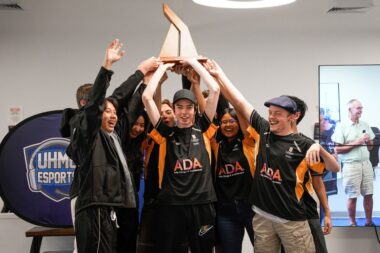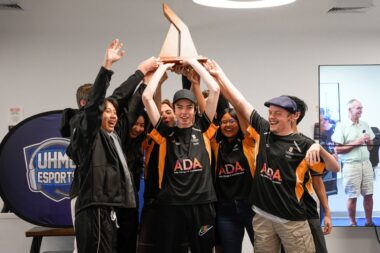The UNSW Sydney academic sees the award as a recognition for supervision practices in the faculty of Law & Justice as a whole.
Professor Ben Golder, at UNSW Sydney’s School of Law, Society and Criminology in the faculty of Law & Justice, has been awarded the 2023 Australian Council of Graduate Research (ACGR) Award for Excellence in Graduate Research Supervision. Prof. Golder is the first UNSW academic to win the award.
Each year, the Australian Council of Graduate Research (ACGR) presents a suite of awards for excellence in graduate research education. First awarded in 2017, they promote quality in higher degree research (HDR) supervision, leadership and industry engagement. As well as the award, recipients each receive a grant of $3000.
“It is a real honour to be selected for this award, and I am grateful to the University for the nomination and their support, and of course to the ACGR for the recognition,” Prof. Golder said.
“But supervision of graduate research students is an inherently collective endeavour, so it is a little unfair to single out particular supervisors. I see this award as a recognition of the supervision practices and culture of the faculty of Law & Justice as a whole.”
Professor Jonathan Morris, UNSW Pro Vice-Chancellor Research Training and Dean of Graduate Research said, “It is brilliant to see Professor Ben Golder recognised at a national level for his outstanding performance as an HDR supervisor.
“Our academics are essential in training UNSW’s HDR candidates and supporting their research efforts. Professor Golder not only has a superb track record in high-quality and innovative HDR supervision, he has demonstrated outstanding leadership. This has ensured that his candidates have significant opportunities to enhance their research training.”
Being a postgraduate supervisor and mentor
Prof. Golder has a particular interest in postgraduate supervision, mentoring and career development for higher degree and early career researchers. In 2022, he received the Arc Postgraduate Council (PGC) Research Supervisor Award for the Law & Justice faculty (a UNSW student-nominated and judged award) and the UNSW Vice-Chancellor’s Award for Excellence in Higher Degree Research Supervision.
“I think what I find most rewarding about HDR supervision is also what I find most challenging about it, which is the intellectual exercise of trying to inhabit someone else’s project and ideas. And then to help them to execute the project in their own way and in their terms, but guided by your experience of what will work and what won’t work,” Prof. Golder said.
“Students tend to either start with, or very quickly attain, greater subject matter expertise than their supervisors. But what supervisors know is how to think about a project and how to pose and answer research questions. Helping guide students to conceptualise their project in a way that is feasible and intellectually interesting to them is often challenging but always rewarding.”
Prof. Golder said academics learn how – or maybe how not – to supervise from their own supervisors, and that he was “very lucky to be supervised by one of the best”.
“And then we continue to develop as supervisors by working alongside colleagues, especially more senior colleagues, each of whom has a different approach from which you can learn something. Plus, you sit on review panels for other students and discuss different approaches with your colleagues, both at UNSW and beyond. And so it is challenging, I think, to single out individual achievements in this context,” he said.
Postgraduate supervision at UNSW Law & Justice
Currently Prof. Golder is supervising a diverse range of topics: a genealogy of the right to resist; a theoretical and archival analysis of the sexed, raced and gendered dimensions of Prohibition in early twentieth-century America via the work of Georges Bataille; an ethnographic account of Pakistani terror trials; and a critique of the aerial politics of migration and deportation in the Mediterranean.
“The students across the faculty, both the ones I am formally supervising and the ones I work with and mentor, are genuinely inspiring,” said Prof. Golder.
“Supervising HDR students gives you a chance to play a role in training, mentoring and supporting the next generation of legal researchers. If the students in UNSW Law & Justice are anything to go by, the future of the discipline is well served.”
Prof. Golder’s own research focuses on the intersection of critical legal theory, contemporary political theory and international law and human rights. He is research associate at the Australian Human Rights Institute and a member of Gilbert + Tobin Centre of Public Law at UNSW. He currently teaches courses in legal theory, law and social theory, and the politics of human rights.
At UNSW, Prof. Golder convenes an interdisciplinary Critique Now network, a skill-share group of HDR students, and beyond UNSW, he collaborates with colleagues at the University of Melbourne and La Trobe University to deliver The Academic Skills Circle (TASC). Prof. Golder is also a member of the newly formed Transnational Association of Legal Scholars (TALS). In this setting, he will help to deliver the inaugural Academy in Advanced Legal Research and Method to early career and doctoral scholars.
Contact details:
Belinda Henwood
UNSW Corporate Communications
0412 270 034



